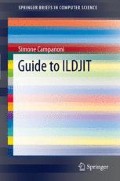Abstract
Code transformations are useful for different purposes, such as improving performance, reducing memory used at runtime, reducing power consumed by the program, and so on. Usually, code transformations rely on code analysis applied either at static time or at runtime (i.e., code profiling). This chapter describes how to implement both code analysis and code transformations inside ILDJIT by describing the interface between them and the framework. Finally, several examples are both provided and described.
Access this chapter
Tax calculation will be finalised at checkout
Purchases are for personal use only
Author information
Authors and Affiliations
Corresponding author
Rights and permissions
Copyright information
© 2011 Simone Campanoni
About this chapter
Cite this chapter
Campanoni, S. (2011). Analyzing and Transforming Programs. In: Guide to ILDJIT. SpringerBriefs in Computer Science. Springer, London. https://doi.org/10.1007/978-1-4471-2194-7_6
Download citation
DOI: https://doi.org/10.1007/978-1-4471-2194-7_6
Published:
Publisher Name: Springer, London
Print ISBN: 978-1-4471-2193-0
Online ISBN: 978-1-4471-2194-7
eBook Packages: Computer ScienceComputer Science (R0)

